Choosing the right nourishment for your little one is an essential part of parenting, and one aspect that often gets overlooked is the type of water you give to your baby. Bottled water plays a critical role in our overall health, and it is even more significant when it comes to infants’ growth and development. As their bodies and immune systems are still developing, the quality of water they consume can directly impact their well-being.
In a market saturated with options, deciding the best type of water for your baby can be an overwhelming task. This ranges from tap water that you get right from your faucet, to bottled, filtered, distilled, or nursery water that you purchase from the store. Each type has its pros and cons, and understanding these can help you make the best decision for your baby’s health.
This article aims to shed light on this crucial aspect of infant care. We will delve into the different types of bottled water available, their benefits and potential drawbacks, and tips on how to safely store and serve water to your baby. Our goal is to provide you with the knowledge you need to ensure that your little one stays hydrated and healthy.
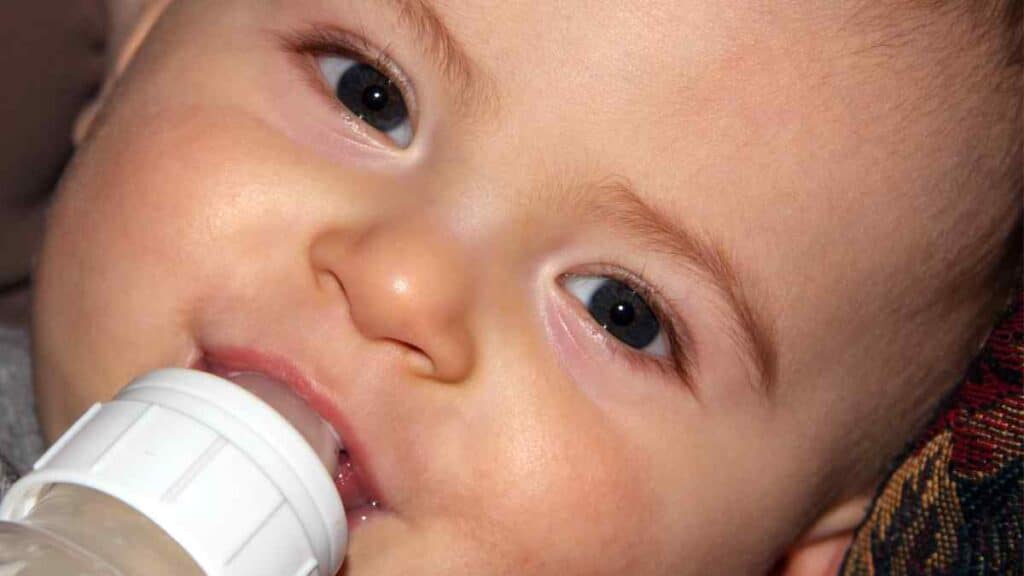
Different Types of Water for Baby Formula
When preparing your baby’s formula, the choice of water you use can greatly impact the overall nutrition your baby receives. The World Health Organization and the Centers for Disease Control and Prevention recommend different types of water, depending on your baby’s age and health status. Here are some of the most commonly used waters for formula preparation:
Tap Water
Typically, tap water is safe for preparing infant formula. However, it’s essential to ensure your tap water is free from contaminants. In many developed regions, tap water is treated and contains essential minerals. However, tap water can contain too much fluoride, which, in excessive amounts, could lead to dental fluorosis in babies [1]. To ensure it’s safe, boiling tap water for a minute and then letting it cool can kill any bacteria or parasites present. It’s best to use boiled water within a few days to maintain its purity.
Bottled Water
Bottled water is often perceived as a safer option because it’s processed and purified. However, not all bottled waters are created equal. Some bottled water may contain high levels of sodium or sulfate, which aren’t ideal for babies. Low-fluoride bottled water may be preferred for infant formula. Bottled water can also be expensive over time and contribute to plastic waste.
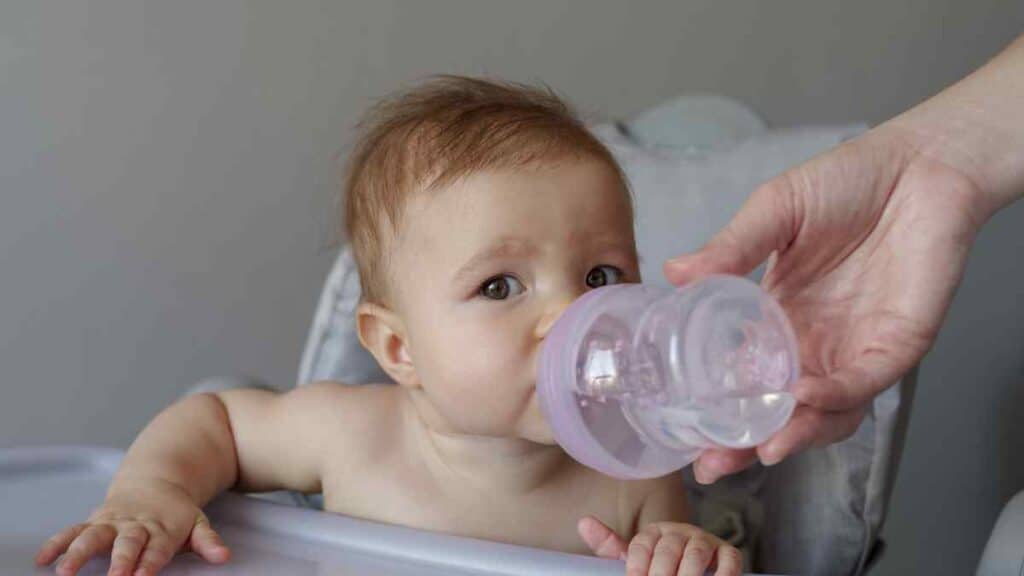
Filtered Water
Filtered bottled water is a good option if your tap water isn’t suitable for drinking. It involves running tap water through a filter to remove impurities. Remember, though, that not all filters remove fluoride, so it’s essential to check whether your filter does this if you’re concerned about fluoride content.
Distilled Water
Distilled water is a type of purified water that’s been boiled into steam and cooled to collect condensation. This process removes minerals and impurities, making it a safe option for mixing formula products. The downside is that beneficial minerals are also removed in the process. Note that distilled water doesn’t contain fluoride, so it’s not a concern here.
Nursery Water
Nursery water is marketed specifically for babies. It is often purified or distilled and may also have added minerals and fluoride. However, fluoride content varies, so it’s important to check the label. Nursery water may be more expensive than other types and not necessary if your tap water is safe for drinking.
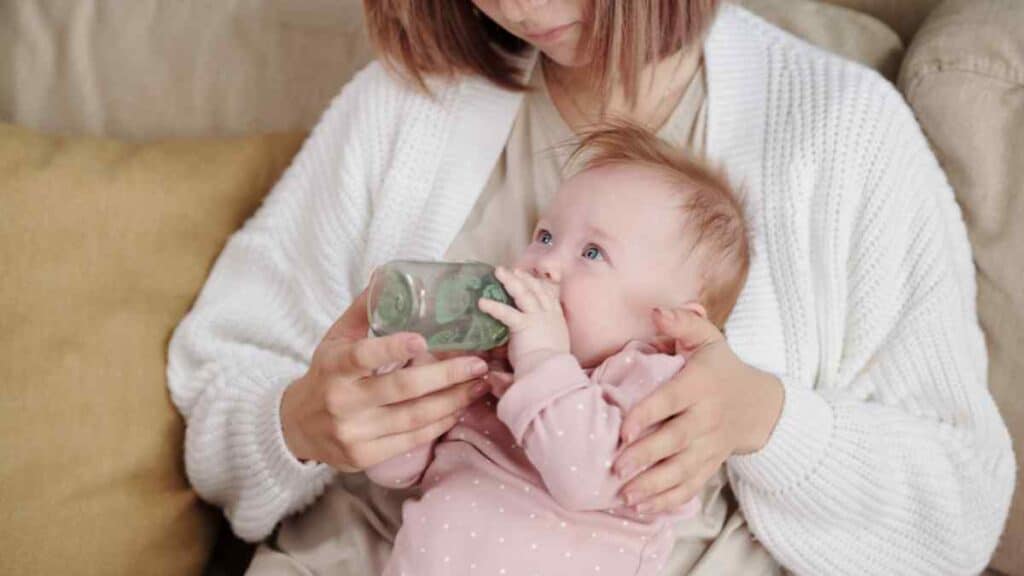
Important Factors in Choosing Water for Baby Formula
Selecting the appropriate water for your baby’s formula is a critical decision that can impact your baby’s health. Various factors should be considered when choosing the best water for baby formula. Here are some key considerations to help guide your choice.
Age of the Baby
The age of your baby plays a crucial role in the type of water you choose. For newborns and infants under six months, it’s recommended by the Centers for Disease Control and Prevention (CDC) to use boiled tap water or distilled water to prepare infant formula to minimize the risk of infection from any potential pathogens in the distilled water. As the baby grows older, their immune system strengthens, and other types of water can be introduced.
Source and Purity of the Water
The source of the drinking water can impact its purity. Tap water, although easily accessible, might contain pollutants depending on your geographical location. On the other hand, bottled water labeled as distilled or purified has been processed to remove impurities. However, remember to check for any added ingredients, like minerals or fluoride, in baby bottled water. For purity, distilled water for babies is a safe bet as it’s free of minerals, impurities, and fluoride.
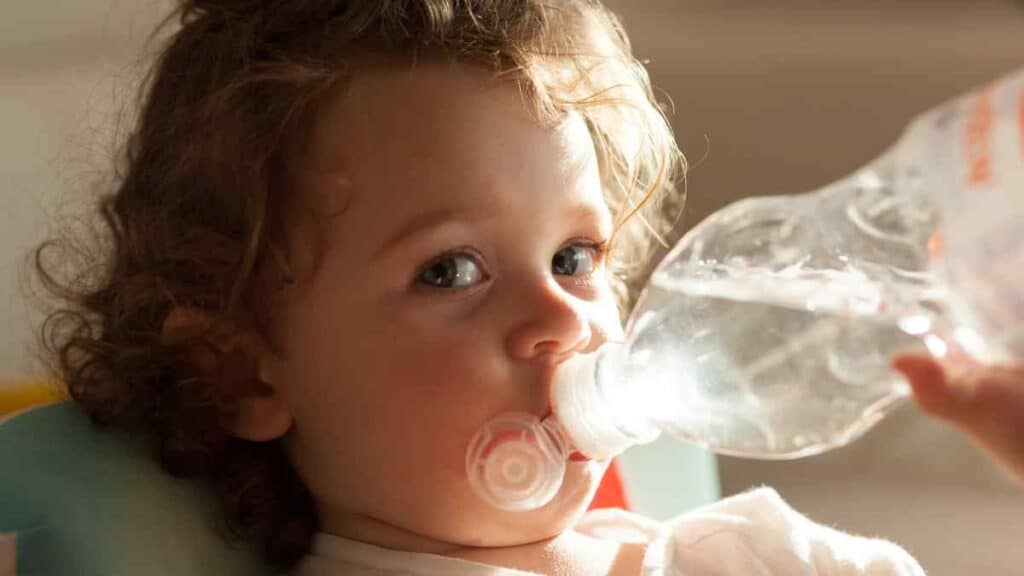
Mineral Content
Minerals are crucial for a baby’s growth and development. However, some waters might have excessive minerals that aren’t ideal for a baby. For example, some bottled waters may contain high levels of sodium or sulfate. When mixing formula products, consider water that has the necessary minerals in the right amounts.
Fluoride Content
Fluoride is a beneficial mineral for dental health, but too much fluoride can cause dental fluorosis in babies. Fluoridated water is generally not recommended for babies under six months. Boil tap water or choose low-fluoride or fluoride-free bottled water to prepare infant formula.
Preparation Method
Lastly, how you prepare drinking water for baby formula is equally important. It’s advised to boil tap water for one minute to kill any potential bacteria or pathogens. Always let the water cool before mixing the formula. For bottled, distilled, or purified water, ensure it’s at room temperature before you mix infant formula.
The choice between purified vs distilled water or tap vs bottled water should be guided by these factors and consultation with your healthcare provider. By considering the age of your baby, the source and purity of the water, the mineral content, and fluoride levels, you can choose the best water to mix with your baby’s formula to support their healthy growth and development.
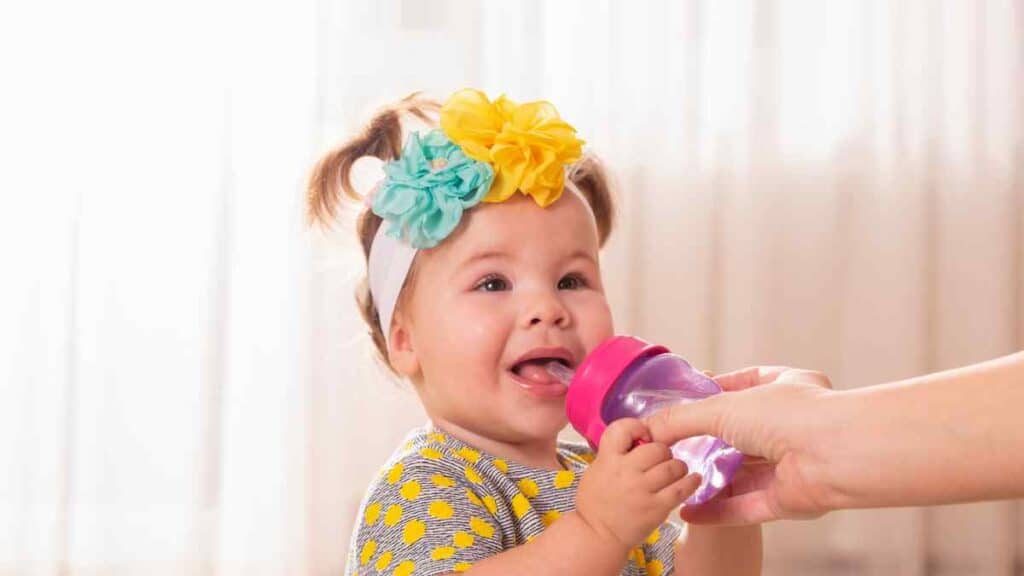
Effective Tips to Safely Store and Serve Water to Your Baby
Ensuring your baby’s health extends beyond just choosing the right water for prepared formula. It’s also crucial to store and serve this water safely to maintain its purity and ensure the overall well-being of your little one. Here are some tips to guide you on how to safely handle water for your baby’s formula.
Proper Storage Methods to Maintain Water Purity
Whether you are using tap, bottled, distilled, or purified water for your baby’s formula, the way you store it matters. Once boiled or opened, water should be stored in a clean, sealed container in the refrigerator to keep it safe and fresh. Use refrigerated boiled water within a day for maximum freshness. For bottled water, once opened, it’s best to use it within a few days to prevent any potential bacterial growth.
Serving Water at the Right Temperature
The temperature at which you serve water, especially when mixing infant formula, is essential. Hot water can cause burns, and cold water might not be comfortable for your baby. Aim to serve lukewarm water, ideally at body temperature (around 98.6°F or 37°C). Always test the temperature on your wrist before feeding your baby.
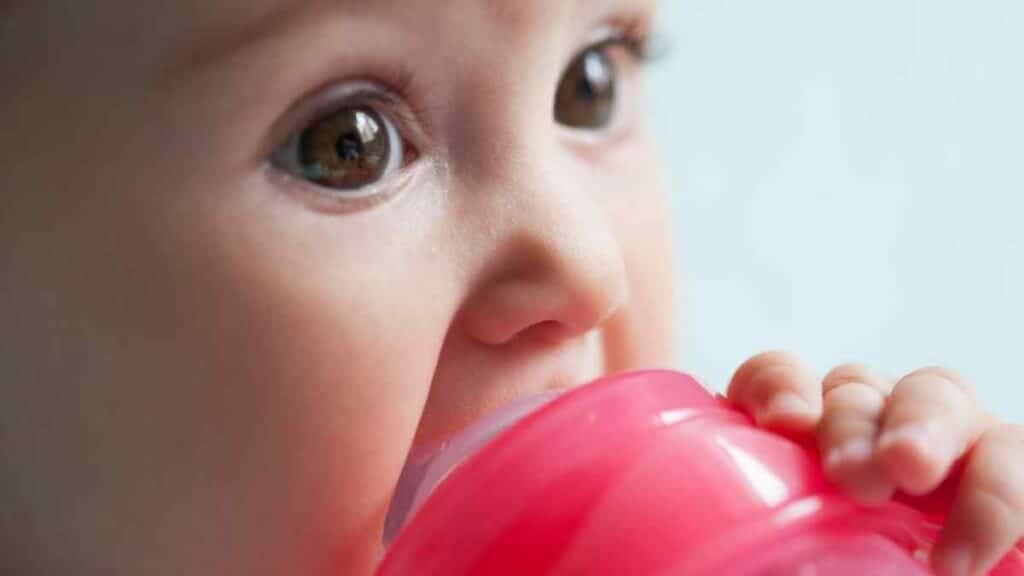
Keeping Water Containers and Bottles Clean and Sterilized
It’s not just the drinking water that needs to be cleaned; the containers and bottles you use also need to be sterilized. Any bacteria present in the bottles can contaminate the water and, subsequently, the formula. Sterilize bottles and nipples by boiling them in water for about five minutes before the first use and cleaning them in hot, soapy water after each use. You should also sterilize them if your baby has been sick.
Proper Preparation of Formula
When you’re ready to prepare the formula, be sure you’ve washed your hands thoroughly. Mix formula products according to the instructions on the powdered formula container to ensure your baby gets the right nutrients. Overdilution or underdilution can cause issues, so it’s essential to get the right balance.
The decision between purified vs distilled water or nursery vs tap water is a significant first step, but safe storage, serving practices, and bottle hygiene are just as crucial in keeping your baby healthy. By following these guidelines, you can feel confident that you’re providing the best care for your little one at mealtime.

Choosing the Optimal Water for Your Baby
Selecting the right water for your baby is essential to ensuring their health and well-being. There are several factors to consider when making this decision, including your location, water source, and any specific health considerations or preferences.
Your Location and Water Source:
Water quality can vary depending on where you live and the source of your water supply. It’s important to research the safety and quality of your local tap water by checking your area’s water report or contacting your water provider.
Health Considerations and Preferences:
Some infants may have specific health needs or sensitivities that require using a particular type of water, such as distilled or purified water. Additionally, parents may have preferences regarding the water they use for their baby based on taste, convenience, or environmental concerns.
Ready-to-Feed Formula:
An alternative option for parents who are concerned about water quality is to use ready-to-feed formula. This type of formula comes pre-mixed and does not require adding water, eliminating the need to worry about water quality or treatment.
By carefully considering these factors and weighing the pros and cons of different water options, you can make an informed decision that best suits your baby’s needs and your personal preferences.

Preparing and Storing Formula Safely
Preparing and storing formula safely is essential to ensure your baby’s health and reduce the risk of contamination. Here are some guidelines to follow:
Here are the step-by-step instructions for formula preparation:
1. Sterilizing Equipment and Bottles
- Wash your hands thoroughly with soap and water.
- Disassemble the bottles, nipples, and other feeding equipment.
- Rinse them under running water to remove any remaining formula.
- Boil a large pot of water and immerse the equipment in it for at least 5 minutes.
- Remove the equipment using clean tongs and let them air dry on a clean surface or drying rack.
2. Measuring Water and Formula Accurately
- Read the instructions on the formula packaging to determine the correct water ratio to formula powder or liquid concentrate formula.
- Boil tap water or distilled water and let it cool to room temperature.
- Measure the required amount of water using a sterilized measuring cup or bottle.
- Scoop the appropriate powdered infant formula or pour the liquid concentrate formula into the water.
- Mix well by shaking or stirring until the formula has completely dissolved.
3. Warming Formula to Body Temperature
- If your baby prefers warm formula, you can gently warm the prepared formula by placing the bottle in a bowl of warm water or using a bottle warmer.
- Test the temperature of the formula by shaking a few drops onto the inside of your wrist. It should feel slightly warm but not hot, similar to body temperature.
Here are the proper storage of prepared formula:
1. Refrigeration Guidelines
- Store the prepared formula in a clean, covered container in the refrigerator.
- Keep the temperature of the refrigerator between 35°F (2°C) and 40°F (4°C).
- Label the container with the date and time of preparation.
- Use the prepared formula within 24 hours of making it. Discard any unused formula after this time.
2. Discarding Leftover Formula Safely
- Follow the “use by” date on the formula packaging to ensure freshness and safety.
- Discard any formula left at room temperature for more than 2 hours.
- Discard the remaining formula if your baby does not finish a bottle within one feeding. Do not save it for later use, as bacteria from your baby’s mouth can contaminate the formula.

Conclusion
Navigating the journey of parenthood can often be overwhelming, especially when it comes to ensuring the best nutrition for your little one. A seemingly simple decision like choosing the right water for your baby’s formula can have profound impacts on their health. The choice between tap, bottled, filtered, distilled, or nursery water depends on various factors such as your baby’s age, the source and purity of the water, its mineral content, and fluoride content.
Remember, while water purity is important, storing and serving it properly is also crucial. Correct storage methods, serving water at the right temperature, and keeping water containers and bottles clean and sterilized can go a long way in maintaining your baby’s health.
It’s also essential to remember that every baby is unique. What works best for one might not work as well for another. If you ever feel unsure about your water choice, don’t hesitate to consult with a healthcare professional. They can provide personalized advice based on the specifics of your local water supply and your baby’s health needs.
In the end, being informed and mindful of these factors will help you make the best decisions for your baby’s health and well-being. With this knowledge in hand, you can ensure that your little one stays hydrated, healthy, and happy.
Did this article answer your questions? If so, feel free to ask any questions in the comments.



